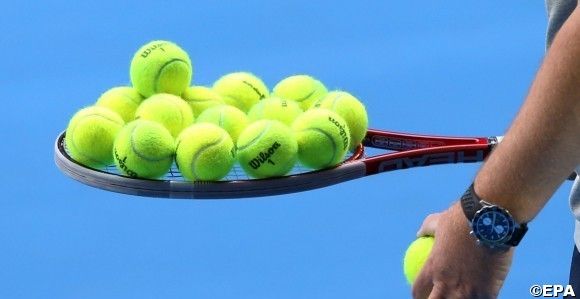Claims Are Made That Integrity Unit Is Not Properly Equipped To Do Its Job
 Claims Are Made That Integrity Unit Is Not Properly Equipped To Do Its Job
Claims Are Made That Integrity Unit Is Not Properly Equipped To Do Its Jobepa03532956 Coach Michael Joyce of Maria Sharapova holds a raquet with tennis balls during a practice session of the second seeded at the Australian Open Grand Slam tennis tournament in Melbourne, Australia, 13 January 2013. The first round of the Australian Open kicks off on January 14th. EPA/Dennis Sabangan |
After the Tennis Integrity Unit (TIU) announced yet another obscure player, in this case 1,158th ranked Dutchman Yannick Ebbinghau, had been snared, fined and suspended for violations of the sport’s rules anti-corruption rules, claims have been made that the specially formed body is not properly equipped to deal with the betting problem.
Britain’s Mail On Sunday newspaper maintains to have spoken to a senior official with a long track record of tackling sports corruption who insists the TIU is struggling to get even close to the true problems of corruption in tennis due to the influence of big gambling syndicates in the Far East and Russia.
The unnamed source also maintained that well-known players implicated in suspicious matches are escaping while lesser-known transgressors are being punished, some with lifetime bans.
He said: “The ‘tennis family’ were aware that there was no smoke without fire. They’d had years of accusations of fixing and plenty of hard betting data indicative of fixing. They knew there were people who were corrupt, and corruptible, and there still are.
“Almost four years after the TIU were set up, I can only conclude that they’re not as effective as they might have been… there are a lot of cheats out there.”
The TIU, set up in London four years ago and funded by the International Tennis Federation, the ATP World Tour, the WTA and the Grand Slam Committee, has just undergone a change of leadership with former Metropolitan Police veteran Nigel Willerton, a former officer in the renowned Flying Squad or ‘Sweeney’ replacing the now retired Jeff Rees.
Meanwhile the policy of maintaining a lack of transparency and refusing to discuss cases in public, or even reveal details of verdicts continues, is being run on limited resources and cannot do a proper job of eradicating corruption.
To date the highest profile player to be caught TIU investigations is Austria’s Daniel Kollerer, the former world no.55 who was banned for life in May 2011.
The Mail on Sunday investigators suggest some tennis insiders claim the TIU has been wary of publicly dealing with ‘big name’ players who may have broken the rules, for fear of damaging tennis’s reputation and losing sponsors.
“There were certainly elements within the ruling bodies, who fund the TIU, that wanted stuff swept under the carpet,” said the unnamed source. “But to do the job to the full extent, you need to tackle the higher profile people involved and not just the lesser players.
“If you don’t want a problem with bigger players, don’t look for it. And if you want to look for it, be aware that it won’t smell sweet.”


10sBalls Top Stories
- Best WhiteLabel Esports Gaming Providers in Asia
- White-label Casino Platforms for Startups in Southeast Asia
- White-Label Online Casino Platform with Live Dealer Games in Asia: A Rising Trend in iGaming
- Reliable White-Label Sportsbook News Platforms in Asia
- Bahis Sitelerinin Deneme Bonusu Kullanım Şartları
- Deneme Bonusları ile Ücretsiz Bahis Nasıl Yapılır?
- Cazip Hoş Geldin Bonusları ile Üyelik Avantajları
- Bahis Siteleri ve İlk Üyelik Bonusu Detayları
- Yeni Üyeler İçin En Cazip Bahis Bonusu
- Deneme Bonusları İle Eğlenceli Oyun Deneyimleri
- Güvenilir Bahis Siteleri: Bonus ve Güvenlik İncelemesi
- Reasons Behind the Increase in Sex Shops
- Reasons Behind the Increase in Sex Shops
- Reasons Behind the Increase in Sex Shops
- Casibom: Yaşayan Casinolar ve Bahisler Lider Platform




